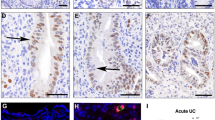Abstract.
Objective and Design:
We evaluated the role of the osmolarity in the pro-inflammatory responses of epithelial cells.
Material:
Twenty-five female Wistar rats and colorectal (HT-29) and bladder (T24) cell lines were used.
Treatments:
Rats and cells were exposed for 48 hours to hyperosmotic solutions.
Methods:
Interleukin-8 (IL-8) production was measured by Enzyme Linked ImmunoSorbent Assay, mRNA transcription of pro-inflammatory cytokines by microarrays or RNase Protection Assay. Nuclear factor-kappa B (NF-κB) pathway and Protein Phosphatase 2A (PP2A) activations were measured. Myeloperoxydase (MPO) activation and Macrophage-Inflammatory Protein-2 (MIP-2) transcription were monitored.
Results:
The exposure to hyperosmotic solutions enhanced the production of IL-8 and induced pro-inflammatory cytokines transcription. In vivo, MPO enhanced activity accompanied by an increased MIP-2 transcription was observed. In vitro, NF-κB activation is accompanied by an inhibitor of kappa B-alpha degradation and inhibitor of kappa B kinase (IKKγ) activation. We demonstrated the induction of IKKγ after methylation and activation of PP2A. Cytokine induction was inhibited by okadaic acid and calyculin A and stimulated by xylitol.
Conclusion:
Hyperosmolarity can induce pro-inflammatory cytokine responses in colorectal and bladder epithelial cells. Inflammation appears to be the simple consequence of a shift of methylation of PP2A which in turn activates NF-κB.
Similar content being viewed by others
Author information
Authors and Affiliations
Corresponding author
Additional information
Received 3 November 2007; returned for revision 7 December 2007; received from final revision 18 January 2008; accepted by I. Ahnfeld-Rønne 21 January 2008
Rights and permissions
About this article
Cite this article
Abolhassani, M., Wertz, X., Pooya, M. et al. Hyperosmolarity causes inflammation through the methylation of protein phosphatase 2A. Inflamm. res. 57, 419–429 (2008). https://doi.org/10.1007/s00011-007-7213-0
Published:
Issue Date:
DOI: https://doi.org/10.1007/s00011-007-7213-0




